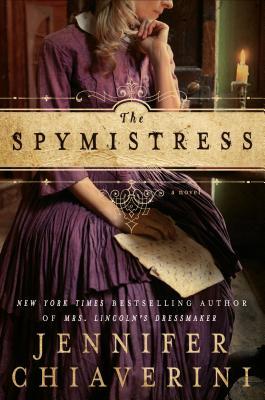by Jennifer Chiaverini
Why did you choose this book? I’ve read other books about Elizabeth Van Lew
When did you read this book? November 2013
Who should read this book? readers interested in Civil War era historical fiction
Source: library
Born to slave-holding aristocracy in Richmond, Virginia, and educated by Northern Quakers, Elizabeth Van Lew was a paradox of her time. When her native state seceded in April 1861, Van Lew’s convictions compelled her to defy the new Confederate regime. Pledging her loyalty to the Lincoln White House, her courage would never waver, even as her wartime actions threatened not only her reputation, but also her life.
Van Lew’s skills in gathering military intelligence were unparalleled. She helped to construct the Richmond Underground and orchestrated escapes from the infamous Confederate Libby Prison under the guise of humanitarian aid. Her spy ring’s reach was vast, from clerks in the Confederate War and Navy Departments to the very home of Confederate President Jefferson Davis.
Although Van Lew was inducted posthumously into the Military Intelligence Hall of Fame, the astonishing scope of her achievements has never been widely known. In Chiaverini’s riveting tale of high-stakes espionage, a great heroine of the Civil War finally gets her due
My Review
I picked this book up because I recognized the author, having recently read Mrs. Lincoln’s Dressmaker. When I learned the book was about Elizabeth Van Lew, I knew I wanted to read it. Until last year, I had never heard of Elizabeth Van Lew. That is, I hadn’t heard of her until I read Miss Lizzie’s War by Rosemary Agonito. Then earlier this year I read The Secret Life of Mary Bowser by Lois Leveen, which told the story from an alternate point of view. I was fascinated with Elizabeth and it was an easy choice to pick this one up!
One thing I found interesting is how these authors can start out with the same set of facts and the same historical conclusion, and come up with three very different stories! I really appreciate that the authors helped me separate fact from fiction by explaining how their imaginations gave them various scenes. While Elizabeth is basically the same person with the same Unionist convictions in all three books, her evolution into ‘spy’ was a bit different in each. Mary Bowser was a much more central character in the other two books than she was in this one.
I really felt that this book gave me a more ‘personal’ glimpse into Lizzie’s thoughts and emotions. While her Unionist loyalties were always there, I like how this book showed the evolution of her character. At the beginning she was simply a Unionist like many others, doing small things where she could, with no real organization or plan. She was trying to toe a line between helping the prisoners as she could and not risking her safety and especially the safety of her family. It took quite sometime for her to discover a way to work together with other Unionists in a meaningful way. One thing a really like was that the last chapter gave a glimpse of what Lizzie’s life was like after the war. I also appreciated the author’s notes.
My Rating: ★★★★ 4 Stars

No comments:
Post a Comment